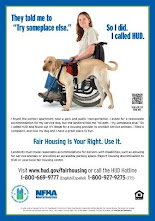The U.S. Department of Housing and Urban Development (HUD) is charging individuals and entities associated with a Kailua-Kona, Hawaii, condominium complex, including the condominium association, employees of the condominium association, the property management company, an employee of the property management company, the condominium unit’s owners, and the owners’ real estate broker with discriminating against a resident because of disability. Read HUD’s Charge. HUD’s Charge of Discrimination alleges that the property’s condominium association and its employees, the property’s management company and its employees, and the condominium unit’s owners and their real estate agent, prevented the resident from using a temporary ramp to safely access his unit, from accessing a parking space that would allow him to load and unload his wheelchair, and from replacing a toilet at the resident’s own expense to allow him complete use of his unit. Because they failed to do so, the resident was often unable to access or use his unit and forced to sleep in his vehicle. Ultimately, their actions resulted in the resident’s decision to revoke his offer to purchase the unit and move out of the unit, which he was renting while the sale was in escrow. A U.S. Administrative Law Judge will hear HUD’s charge unless any party elects to have the case heard in Federal district court. If the Administrative Law Judge finds, after a hearing, that discrimination has occurred, the judge may award damages to the resident for his losses as a result of the discrimination, order injunctive relief and other equitable relief to deter further discrimination, and payment of attorney fees. In addition, the judge may impose civil penalties to vindicate the public interest. If the Federal court hears the case, the Judge may also award punitive damages to the resident. In related news, the Pacific ADA Center recently noted that the U. S. Department of Justice just settled with some Hawaii apartment builders over disability discrimination. The developer and others were accused of not designing and building five multifamily housing complexes with the required accessible features. The agreement requires the companies to pay a fine and make changes to their properties, such as adding ramps, accessible parking, and making apartments easier for people with disabilities to enter and use. Read more about the lawsuit that is making these rental properties accessible. |
Info about Fair Housing in Maryland - including housing discrimination, hate crimes, affordable housing, disabilities, segregation, mortgage lending, & others. http://www.gbchrb.org. 443.347.3701.
